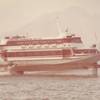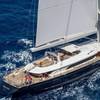IMarEST President's Lecture Focuses on Failure
Engineering failures in the marine industry certainly cost time and resources to correct and, sadly, sometimes resulting in loss of life.
At his President’s Day Lecture, Professor John Carlton FREng, Professor of Marine Engineering, City University London and the 109th President of the Institute of Marine Engineering, Science and Technology (IMarEST), will retrospectively discuss some of the marine failures that he has encountered, with the aim of teasing out the underlying issues that have contributed to their causes. The President’s Lecture will be held Tuesday 11 October at IET London in Savoy Place, London WC2. Tea will be served from 17.30, the President’s Lecture will begin at 18.00 and a Reception will follow at 19.00. The evening is free to all IMarEST Members and Marine Partners and to non-members completing an Elective Member application at the time of booking. Information is available from [email protected] and from +44 (0)20 7382 2600.
“Much of my working life has been involved in investigating marine failures,” Professor Carlton explains. “The positive side of them is, of course, the lessons learnt and this will be covered in what I hope will be a stimulating discussion session when we are able to look at the role of technology transfer; and how – from a marine industry and Institute perspective, those all-important lessons might be implemented to endeavour to prevent repetition in the future.
“Some of the examples I will be looking at on 11 October in order to draw wider conclusions include examples from ship propulsion train design and manufacture, ship propulsion hydrodynamics, ship structure and seakeeping, some repair issues together with aspects of control and human failure.
“You only have to think back nearly a hundred years to the tragic sinking of RMS Titanic and remember the considerable safety legacy that resulted from that disaster – lifeboats for all, changes to ensure all watertight bulkheads extended up to the main deck; the establishment of the International Ice Patrol, and the SOLAS convention - to realise how important it is to learn lessons as the result of maritime failures,” he adds. “The Institute has very close links with RMS Titanic, indeed, the IMarEST Guild of Benevolence – born out of that tragedy – has launched a global fund-raising campaign to ensure that its assistance to needy members of the global marine engineering community (whether members of IMarEST or not), and their dependents, can continue well into a further century.
About the 109th President
Following a long and distinguished career, and following his role as Lloyd’s Register’s Global Head of Marine Technology and Investigation, John Carlton joined City University London full-time in 2010 as Professor of Marine Engineering, following a long association with the University. Professor Carlton is Course Director for the City University’s very successful MSc in Maritime Operations and Management programme, supervises several postgraduate students, engages in marine research and supports the City Collaborative Transport Hub – an interdisciplinary network centred on transport challenges.
Following training, first as a mechanical engineer and then subsequently as a mathematician, John Carlton served in the Royal Naval Scientific Service undertaking research into underwater vehicle hydrodynamics and propulsor technology. After five years he joined Stone Manganese Marine Ltd. as a marine propeller designer and research engineer. During that period while his principal interests were controllable pitch propeller and transverse propulsion unit technology, he also undertook studies into ship resistance and propulsion, merchant and naval ship machinery simulation, manoeuvring, novel propulsor development, vibration and noise.
“While in this role I undertook some lecturing duties and worked closely with the University of Newcastle upon Tyne on various fluid dynamic research topics,” he explains his first foray into academic life; an interest in inspiring young engineers on a path of continuing professional development that has continued throughout his working life, culminating in his current role at City University. In 1975, he joined Lloyd’s Register and undertook failure and accident investigations into ship, offshore and land based problems. The work embraced fluid dynamics, fracture mechanics, metallurgical, noise, propulsion, strength, thermodynamic and vibration aspects of failure including risk and human factor issues. Nine years later he transferred to the Advanced Engineering Department as its Deputy Head dealing with engineering research, development, design and consultancy.
“In this group, and subsequently in the Performance Technology Department, I initiated and headed several research and development initiatives,” he explains. “These included the development of a steady and transient diesel engine simulator; combustion analysis; marine exhaust emission studies; fracture mechanics; machinery dynamics and simulation; machinery condition monitoring; computational fluid dynamics; artificial intelligence and risk based methods; ice technology and propulsor analysis.”
In 1992 he returned to the Technical Investigation Department, taking part of the Performance Technology Department with him, as the Senior Principal Surveyor and Head of Department. In this position he had full technical, commercial, developmental and managerial responsibility for a group of around forty engineers, scientists and mathematicians. The role of that combined group was to undertake failure investigations on a world-wide basis for external clients and Lloyd’s Register; design studies; performance evaluations; risk evaluation exercises and also to act in a Rule development capacity when required.
“In 2003 I was invited to become Lloyd’s Register’s Global Head of Marine Technology and Investigation,” he says. “In this capacity I was responsible to the Technical Director and my group undertook concept and evaluation studies into new technical areas; make an input into the technical strategy for Lloyd’s Register; explored the implications of emerging technologies in relation to the needs of the marine industry; implemented new technical initiatives; interacted closely with clients at a senior technical level; resolved technical disputes and lead major investigations of a complex technical, commercial and legal nature.” He retired from this role in 2010.
During his career Professor Carlton has presented and published over a hundred technical papers and articles on many aspects of marine technology as well as having written a textbook on marine propellers and ship propulsion which has become a standard work on the subject and is now in its 2nd edition. He is also a contributing author to the Marine Engineering Reference Book. Each year he represented Lloyd’s Register at many international meetings and conferences and regularly gave interviews to the media.
He was twice awarded both the IMarEST Denny Gold Medal and the Stanley Gray Award for Marine Technology. He chairs various international research committees, and has been involved with several governmental and naval initiatives on various maritime matters. Additionally, he has acted as an independent chairman of technical committees for major international marine arbitration cases. In 2006 he was awarded the degree of Doctor of Science in recognition of his contribution to marine technology; and in 2011 he was conferred as a Fellow of The Royal Academy of Engineering.















